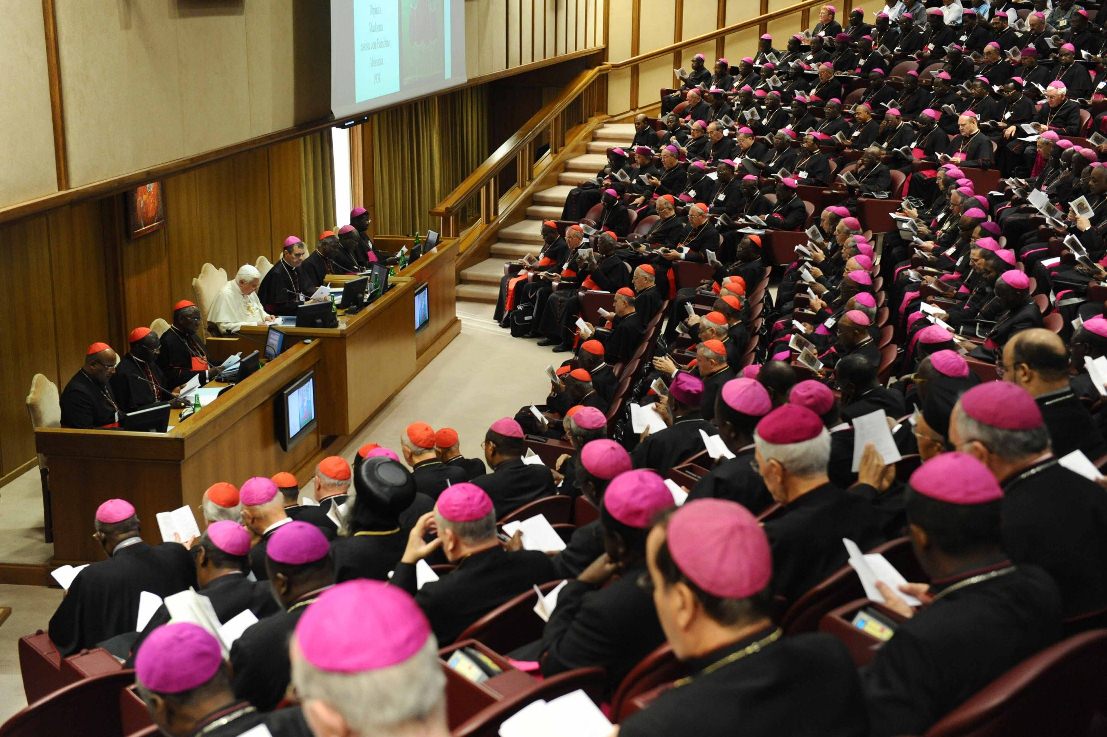The following is a guest post from Julie Hanlon Rubio, professor of theology at Saint Louis University.
The German-speaking group of bishops at the Synod in Rome is proposing a solution to the seemingly intractable question of Communion for divorced and remarried Catholics. The fact that this theologically diverse group was able to come to agreement makes this proposal especially worthy of consideration. This could be the game changer that allows the synod fathers to preserve the Church’s commitment to the enduring one-flesh union of sacramental marriage while also upholding the inclusive and healing nature of the Eucharist.
There is not much time left. Two days of discussion remain, followed by paragraph-by-paragraph voting on the final document on Saturday, and the closing Mass on Sunday. The “internal forum,” as distinguished from the “external forum,” is for matters of conscience involving the lives of individuals. Issues involving the public life of the Church are resolved in the external forum.
In his 1983 apostolic exhortation following the last synod on the family, without using the term “internal forum,” John Paul II recognized the special situation of those “who are sometimes subjectively certain in conscience that their previous and irreparably destroyed marriage had never been valid.” While reaffirming the Church’s practice of excluding them from Eucharist, he urged that this group should be a part of the Church’s life and should not “consider themselves as separated from the Church.”
As the Church has engaged in process of listening during the 2014 and 2015 synods, it has heard time and time again that many divorced and remarried people do in fact feel “separated from the Church.” The practice is not saying what we want it to say.
The German group proposes using an internal forum solution both for those to whom John Paul II drew attention and to those who first marriages were sacramental but failed. Drawing on the argument of Cardinal Kasper in The Gospel of the Family, the bishops propose that spouses would seek guidance from a priest, acknowledge their responsibility for the failure of the first marriage, reconcile with those who have suffered due to the break-up of the marriage, honor duties to family members, and ask for forgiveness.
The proposal includes no public process similar to annulment. Rather, according to Cardinal Marx, the intent is to provide “a spiritual way” to recognize the sinfulness of the breaking of the marriage vows and help faithful Catholics “make a full reconciliation.” This reconciliation would clear the way for removal of all “liturgical, educational, and pastoral exclusion.”
Back in 1983, John Paul II raised several arguments against a change in pastoral practice. The most important are the following: (1) “their state and condition of life objectively contradict that union of love between Christ and the Church which is signified and effected in the Eucharist,” (2) “if these people were admitted to the Eucharist, the faithful would be led into error and confusion regarding the Church’s teaching about the indissolubility of marriage,” and (3), true repentance would mean that they were “sincerely ready to undertake a way of life that is no longer in contradiction to the indissolubility of marriage” by either leaving their second marriage or abstaining from “acts proper to married couples sex with their spouse.”
Most synod fathers realize that asking people to leave marriages or abstain from sex is insufficient. They do not want to ask people to break up a second family. Do they really want couples to abstain from “the marital act”? Married people often find it odd that only sex is named as a “marital act.” In reality, there are many marital acts that might be considered a betrayal to a first spouse. Watching a movie on the couch while holding hands, discussing how to approach a difficult problem with a son or daughter, and preparing a family dinner are all “marital acts” which would be inappropriate for someone who is married to someone else. Whatever infidelity exists in a second marriage cannot be overcome by sexual abstinence.
But we can acknowledge the imperfection of a second union while also hearing faithful people when they say their first union could not continue and they are truly repentant? Can we see that while their “state and condition of life” might be unfaithful in some ways, other aspects of their life, as well as this very union, might also give witness to the Gospel? Could they, like everyone else, be imperfect disciples? Can we really say that they (and so few others) are not worthy to come to the table?
If we do welcome some of the divorced and remarried to Communion, will the faithful be “led into error and confusion”? There are those who sincerely think so. But most Catholics continue to marry, promising (in the face of pervasive marital break-up), “I will love and honor you all the days of my life.” In most places, it is more likely that the faithful will be scandalized by what is seen as a profound lack of mercy. How can Christians say to people who are hurting, “You don’t deserve to eat with us”?
Jesus’ scandalous practice of inclusive table fellowship and his merciful practice in relation to those with imperfect sexual and marital histories should lead us to ask whether our current pastoral practice is faithful to the Gospel. Would Jesus want us to turn people away from the table because they are living imperfect lives?
Perhaps, we can imagine Jesus asking us to do as he did: preach hard truths about marriage, call for forgiveness seven times seven, put discipleship above all. Perhaps, he might have us say more about the pain divorce causes to children and adults (whether an annulment is sought or not), do more to strengthen marriages, and find ways to help couples who are struggling stay together.
But what would he have us do about the woman attending Mass faithfully week after week, living her second marriage vow with all her heart, acknowledging her failures and the hurt she has caused, practicing restorative justice, consulting with others, and slowly becoming ready to approach the Eucharistic table again?
Would not Jesus welcome her back? Would he not tell her, as he told those sinners with whom he ate, as he tells all of us, “Come, come and eat”?
The conflict over Communion is real. But Pope Francis, in Evangelii Gaudium, called the Church to “face conflict head on” (227). He asked us to be people who can “see others in their deepest dignity” and find “a resolution that takes place on a higher plane and preserves what is valid and useful on both sides” (228). For the sake of the Church, I hope the synod fathers find a way to preserve Catholic teaching on marriage while welcoming people back to the Eucharist




Julie, thank you for the post and I agree that it is promising that the German bishops were able to come together on some kind of agreement.
However, I can’t help but think that this proposal, at least as you’ve explained it, has the same problems as Kasper’s original proposal. Most importantly, I think it equivocates on exactly what the reason is why someone would be excluded from communion. As you point out, it is the “adultery” of remarriage while the previous sacramental marriage remains indissoluble. But the “penitential path” outlined here is in reference to the breakdown of the first marriage. While that is certainly good (and in some cases you could probably say also necessary for communion), this is a quite distinct reality from the second marriage. After all, many years could pass between the divorce and remarriage, or a divorced person could never remarry.
So while the penitential path gives the appearance of having recognized one’s sin, in fact it leaves unaddressed the very reason for exclusion in the first place. And so I think it runs the risk of what Pope Francis called the “deceptive mercy [that] binds the wounds without first curing them and treating them.” I think there might be other ways to think about how remarried couples could be restored to communion, but I think this proposal isn’t sufficient because it doesn’t really address the reason why they are being excluded.
he tells all of us, “Come, come and eat”?
But this is definitely not what Jesus tells us. We have the sacraments of Baptism and Penance which precede FIRST communion. And the sacrament of Penance when we are aware of serious sin BEFORE communion. And the institution of sacrament of Communion at the last supper when only the twelve were present.
Marriage is a public act, and as such, attempted remarriage is different from many, if not most other sins, which may be known only to the sinner or potentially a few others.